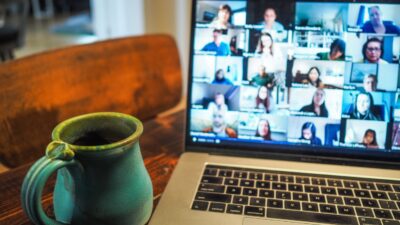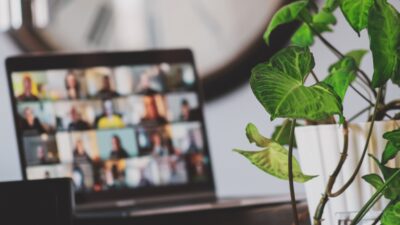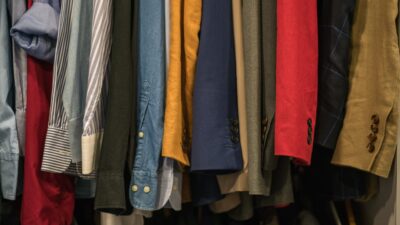Sandra Peter and Kai Riemer

Hybrid office fashion
This week: what should you wear to work: the end of suit and heels and more hybrid office fashion on The Future, This Week.
Sandra Peter (Sydney Business Insights) and Kai Riemer (Digital Futures Research Group) meet once a week to put their own spin on news that is impacting the future of business in The Future, This Week.
The stories this week
06:39 – Has COVID killed the suit?
Other stories we bring up
Our previous discussion on The Future, This Week of Elon Musk and Twitter
The SMH on dressing for success post-COVID
Briony Lipton on aesthetics and gender (in)equality in the post-lockdown era
The BBC on the formal ‘suited and booted’ office dress code
The Financial Times on the pandemic and the wardrobe casualisation
GM’s approach to the office dress code
The WSJ on post-pandemic dress codes and functional-wear
GQ on the oversized, 80s Armani suit
Our previous conversation about the pandemic and fashion on Corona Business Insights
Quartz on office fashion in the metaverse
Follow the show on Apple Podcasts, Spotify, Overcast, Google Podcasts, Pocket Casts or wherever you get your podcasts. You can follow Sydney Business Insights on Flipboard, LinkedIn, Twitter and WeChat to keep updated with our latest insights.
Send us your news ideas to sbi@sydney.edu.au.
Music by Cinephonix.
Note: this episode was recorded before the Twitter board accepted Elon Musk’s offer to buy the company.
Dr Sandra Peter is the Director of Sydney Executive Plus at the University of Sydney Business School. Her research and practice focuses on engaging with the future in productive ways, and the impact of emerging technologies on business and society.
Kai Riemer is Professor of Information Technology and Organisation, and Director of Sydney Executive Plus at the University of Sydney Business School. Kai's research interest is in Disruptive Technologies, Enterprise Social Media, Virtual Work, Collaborative Technologies and the Philosophy of Technology.
Share
We believe in open and honest access to knowledge. We use a Creative Commons Attribution NoDerivatives licence for our articles and podcasts, so you can republish them for free, online or in print.
Transcript
Disclaimer We'd like to advise that the following program may contain real news, occasional philosophy and ideas that may offend some listeners.
Kai Hey, Sandra, what are we talking about this week?
Sandra Well, we could continue talking about Elon Musk. Before we went on holidays, he had just acquired a significant share in Twitter and secured a seat on the board of Twitter, which he has since renounced, and it's looking like he wants to buy Twitter outright, and he's secured the funding for it, apparently.
Kai Yeah, it's been a bit of a ping pong, up and down, left and right. He has announced that he wants to acquire Twitter for $54.20, that number has apparently a 420 joke in it, much like he played before when he announced to take Tesla private for $420. But that's besides the point, the market does not seem to believe that he will actually be able to acquire Twitter, that shareholders will sell it to him, because the share price hasn't moved up. Normally, when a serious takeover bid is on the table, the share price would move close to that bid, but it is still hovering around the $47 mark.
Sandra It remains to be seen if he's serious about this. There were questions about his ability to actually raise that amount of cash, because all his cash is tied up in Tesla and SpaceX stock. But, seemingly, he has been able to, so we'll keep an eye on that and get back to that for an analysis of Elon Musk's thinkings about Twitter and the role of Twitter, we'll put the link in the shownotes to our previous episode.
Kai Well, the prediction is that Elon Musk will keep on making headline news, because that's what he does. And so at any episode in the future, we can then return to what else is developing in this saga. But there has been other platform news.
Sandra Netflix has lost subscribers for pretty much the first time in 10 years. And that has seen about $54 billion in market cap erased after the stock market found out about this. But obviously, the story is not such big breaking news. Netflix was expected to start losing subscribers…
Kai At least it was expected that the growth would be slowing down or stopping at some point. Netflix has been growing tremendously for years, especially during the pandemic. And I think as a platform, they're now learning that exponential growth can't go on forever. And that once you've saturated a market, once you've signed up, in this case, more than 200 million subscribers, it becomes harder and harder to attract new subscribers. That is in part due to just the fact that they are already very big, but also that many of the Hollywood film studios and competitors have launched what are now increasingly successful platforms such as HBO and Disney Plus.
Sandra Paramount, Apple, Amazon, you name it. Not CNN plus, though CNN plus has stopped after, I think it's less than a month.
Kai Just a few weeks.
Sandra Probably a new record in terms of coming to market and then leaving the market.
Kai Yeah.
Sandra But it was clear that Netflix wouldn't be able to sustain the accelerated growth it has had during the pandemic and really just the straight up growth it's had for the past decade in what is already a very saturated market.
Kai And the news is not all that bad. Viewing time on the platform is still up, they are still the biggest platform, they are profitable. All of that is masked by the fact that the share price lost 35% in just two days, which seems excessive. But as always, on The Future, This Week, no investment advice. But it also goes to show that this is now a very crowded market, and while in the beginning Netflix had a lot of shows, back catalogues of various TV studios, companies such as Disney, for example, which also owns the Marvel and the Star Wars franchises, they now own all that content. And there's many other back catalogues that are now found scattered across many different platforms. So, from the point of view of Netflix, there's lots of competition, from the point of view of the customers, and that's something we've discussed previously, and we'll put the link in the shownotes, it is not necessarily an easy situation when it is unclear where you know all your favourite shows are located now, which means that many people have to either sign up to many different platforms, which comes at a significant cost, and complexity, or forego viewing their favourite content.
Sandra In other news, a very influential, once in a decade, report has just come out. This is done every 10 years by a team of planetary science and astrobiology researchers and it's an interesting report because members of Congress, NASA and the entire scientific community kind of heed its advice. And so far, you know, it has led to our examinations of places like Mercury, Venus, Mars, and Saturn, and so on. So this report has now argued for the highest priority, new flagship mission to be to a new and different planet. And on The Future, This Week, we're not going to stoop to cheap puns.
Kai Ha, speak for yourself. An article in Wired Magazine, titled, "scientists want to probe Uranus with a new spacecraft."
Sandra And while that might sound like a really difficult thing to do, and don't worry, there's a decade of puns to come.
Kai Uranus puns yet to come, yes, it is after Mars, now Uranus's turned to be probed by NASA. We leave it at that.
Sandra Because what we really want to talk about today, since we're still on a holiday, is the post-COVID office dress code. Because curiously, there's been quite a few stories around this in the news, there's been an article in The Guardian, calling it "the end of the suit".
Kai And there's also been a report by The University of Sydney Business School on the topic, and so we thought we should talk about it.
Sandra Let's do this
Kai Let's do this.
Intro From The University of Sydney Business School, this is Sydney Business Insights, an initiative that explores the future of business. And you're listening to The Future, This Week, where Sandra Peter and Kai Riemer sit down every week to rethink trends in technology and business.
Sandra So, there's been quite a few stories about the office dress code, or the casualisation of the office wardrobe post-COVID. There's been articles in The Guardian, there's been our own University of Sydney study on this and articles by Briony Lipton, both on Sydney Business Insights, and in the Sydney Morning Herald, the BBC covered it.
Kai The Financial Times had it, Forbes, Fortune, a surprising number of articles all dealing with the question, is the good old fashioned formal dress code with a suit, is that a thing of the past? Has COVID changed how we dress for good.
Sandra And since the Guardian called it "the end of the suit," we thought maybe it's worth having a conversation about what hybrid fashion looks like. We've talked a lot about the hybrid office, but what about hybrid fashion, hybrid workwear.
Kai So first of all, stats don't lie, and there seems to be a remarkable decline in suit wearing, to the extent that the market in the UK, for example, has collapsed from 460 million pounds in 2017, to just 157 million pounds in 2020. During the pandemic, recovering slightly to about 279 million pounds. That's a big deal. And suits have decreased in importance so much that the Office for National Statistics in the UK have now removed it from the basket that they use to calculate the cost of living, it was included every year since 1947. But now for the first time, there is no cost for a suit, just a formal jacket or blazer.
Sandra And Brooks Brothers went bust, like, Brooks Brothers that used to dress, you know, businesspeople everywhere then generations of US presidents, filed for bankruptcy last year. But we've only been talking about suits, high heels sales also plummeted by 45% in 2020. But this is where I actually want to interject and point out how curiously gendered this whole conversation about office attire is, there seems to be only conversation about suits and neckties.
Kai And puns on the same, yes?
Sandra But even the titles of these articles, The Guardian had "the end of the suit," BBC asked whether the formal 'suited and booted' office dress code was extinct. It seems that business suits and ties are the way to refer to workwear where, you know, seems to leave out a lot of the women's workwear and other than heels, it seems that women do not wear any tailored office wear. But we should come back to this, because there's some interesting gender norms that we can discuss in this conversation. But before we go to that, I think it's important to point out that the pandemic has only really accelerated trends in wardrobe casualisation that were kind of there before the pandemic. If you look at wardrobes, going back to the neckties, they have been declining for the last decade or so.
Kai That is, of course, not the same across all professions. But even the most conservative professions such as in banking, investment banking, and consulting, dress norms have become much, much more informal, of course, spurred on by the fact that after months, and in places years, of working from home, of zooming, there has been a noticeable casualisation. Business meetings for quite a while we're done in, you know, hoodies, and sweatpants. And some of that has translated into changing norms while slowly, slowly returning to the office, or to hybrid work arrangements.
Sandra Yeah, but again, many of these norms were kind of relaxing before the pandemic, like before, the year before the pandemic, Goldman Sachs announced that it would remove its formal dress code for all of its employees because of the changing nature of workplaces and that they would favour casual workwear. So, getting rid of jackets and ties as the requirement, but the ability to, you know, have more flexibility in what people would wear has been around for a while. But the question has really come back now, after the pandemic, where people are kind of asking themselves, what should we wear to the office?
Kai And it is quite interesting, because it somewhat mirrors the whole discussion around the office and ways of working, right? Telework, remote work, had been there and had been increasing before the pandemic but the pandemic really made it a thing and has made it a norm and is being asked for by many employees, and the same is true with casualisation in workwear, where very formal workwear has been supplanted by smart casual and in some industries, by outright casual office wear. Even a formal jacket is no longer part of the work environment.
Sandra So the real issue here is that unlike before the pandemic, where we were all kind of working in the same place at the same time, now we've got hybrid working environments, some of us are at home and on zooms, and some of us are at the office, or many of us are some days at home and some days at the office. So what should the appropriate dress code be in that case? Because if you're at home, you might not want to wear a suit, or you might not even want to wear pants and people, you know, can't really tell you're not wearing pants. But once you're back at the office, obviously there's a difference.
Kai You should wear pants.
Sandra Yeah.
Kai You know, no longer optional.
Sandra There's a different dress code for many professional firm services, or lawyers, or consultants. It might mean that it's unlikely that they can really dress down if they're meeting with clients, or if they're having presentations or arguing cases. So where does this leave us?
Kai So even though some companies before the pandemic already abandoned more formal dress codes, there was still fairly stable norms and understandings in place that would tell people what they would wear, much of that has now gone out the window, and many people are still asking what to wear.
Sandra And maybe it isn't surprising that all of these articles seem to be talking about suits and ties, and, you know, dress shoes, and so on. Because maybe the proposition is slightly simpler for men who just dress down, you know, don't wear a tie or don't wear a collared shirt, and then it gets easier. But there seems to be little conversation about women except for maybe we cannot wear heels to the office anymore. These articles seem to ignore the fact that for women, a lot of the dressing up for the office also includes, you know, doing your hair and doing your makeup and so on which we know research has shown that for women equates to being perceived as more competent or more worthy of respect. So it becomes a doubly difficult proposition.
Kai And the articles also make the point that while where men were dressing down at home, in zooms into, you know, hoodies, and jeans, and that they could bring that attire to the office, many women resorted to athleti-wear, something that was quite acceptable while working from home and on Zoom. But something that does not translate into an office environment. And so for women, it seems to be much harder to translate the casual wear that they were used to in the home office environment into the office environment where it's back to, you know, dresses and maybe slightly different shoes and as you said, still makeup. So the question really is, how does casualisation work for women where it's, you know, much more clearer for men?
Sandra Well, that is the question that companies have to grapple with because dressing up for the office, now that we dress down, might sound simpler on the whole, it does become a much more deliberate activity. I think the advice given by the CEO of General Motors was 'dress appropriately'. Well, what's appropriate, you now have to figure out for every occasion. Who are you meeting with? How should you dress up? How much should you dress down? Which for many of us translates into actually more clothes rather than fewer, one for every occasion.
Kai And here is where some interesting innovations have happened, there's some new categories of clothing. For example, on the one hand, this was in the Wall Street Journal, where they introduced the dress sneakers. Sneakers that look like dress shoes that are at once casual, but also look formal, to just jump into that gap between, you know, do I dress comfortably, but how do I still have to project a formal image? There's also innovation in materials, there's now functional wear, quite nice materials that feel more like joggers, but that really look like formal dress pants, for example, again, many of that on the male side of the equation.
Sandra There is the oversized suit that seems to work for both men and women, which does make it a lot more comfortable to hang around.
Kai Is that the 80s comeback?
Sandra Yeah, that does seem to be the 80s Armani double-breasted suit that is two sizes too big comeback.
Kai
This is what GQ called the 'Richard Gere-ification' of fashion playing on Richard Gere's outfits in you know, double-breasted slightly too-big suits with shoulder pads. In my view, there is no excuse for bringing back 80s fashion. But it does play well with the idea of formal wear that is also more comfortable than a very tight-fitting suit.
Sandra GQ also call it 'chasing Kenny G', but, you know.
Kai Yes.
Sandra But in all seriousness, hybrid office fashion is serious business, because companies now actually have to be quite a lot more deliberate in how they approach this. And one thing they can do is try to reduce complexity for people, because that's probably what most employees are struggling with.
Kai Much like we've discussed with hybrid work models, figuring out a few work models that work for everyone to reduce the cognitive load of you know, figuring out every morning, where's my team, and how are we going to connect? To bring back the idea of the dress code to take off the table some of that complexity of how am I going to dress today? Who am I going to meet with, what context am I going to be in? This whole struggle in the morning, what is it that I should wear today? To just bring back the old-fashioned dress code.
Sandra Yes but bring it back in a much more appropriate way. This is an excellent opportunity to challenge gendered norms about how we dress at work, and how we comfortably express our identities at work.
Kai So counter-intuitively, while the idea of casual dressing at work, at first glance sounds like something that is, you know, to be appreciated, that makes life easier. In many ways, it has made it much harder, and the dress code that, to some degree, might normalise the way people dress, not necessarily in a formal way, it could be in a smart casual way, might reduce people's anxiety around wardrobe choices and what is appropriate, and might take away some of the flexibility, but might also give a little bit more certainty not to be dressed in the wrong way, not to be over or underdressed.
Sandra But before we wrap up this episode, one other thing that stands out with all these articles that we've seen over the last week around changes in office workwear, office fashion, is that everyone says 'well, things are still in flux, and we must wait then things are yet to pan out or things are still very much changing. And we must keep an eye on it'. And the temptation is very much for us to say also 'well, you know, let's keep an eye on this'. But I think it's actually quite the opposite. There's a chance to take a deliberate stance on this. Rather than wait for things to play out for companies to actually think about this and make decisions together with their employees on how they want to tackle this. It's an opportunity to undo some inequalities to set a new path but to be quite deliberate about it.
Kai So a chance not only to redefine how the organisation works and put some guidance around that, but at the same time, put a little bit of guidance around what counts as appropriate dressing in different contexts and different situations that people in the business might encounter. And that obviously might be very different in different industries.
Sandra Before it all of course goes straight out of the window because we're all going to be working in the metaverse.
Kai Let's leave that for another day. We'll put a link in the shownotes.
Sandra That's all we have time for today. Thanks for listening.
Kai Thanks for listening.
Outro You've been listening to The Future, This Week from The University of Sydney Business School. Sandra Peter is the Director of Sydney Business Insights, and Kai Riemer is Professor of Information Technology and Organisation. Connect with us on LinkedIn, Twitter and WeChat, and follow, like, or leave us a rating wherever you get your podcasts. If you have any weird or wonderful topics for us to discuss, send them to sbi@sydney.edu.au.
Close transcript














